Video: Britain’s Fittest Farmer 2021 – the final
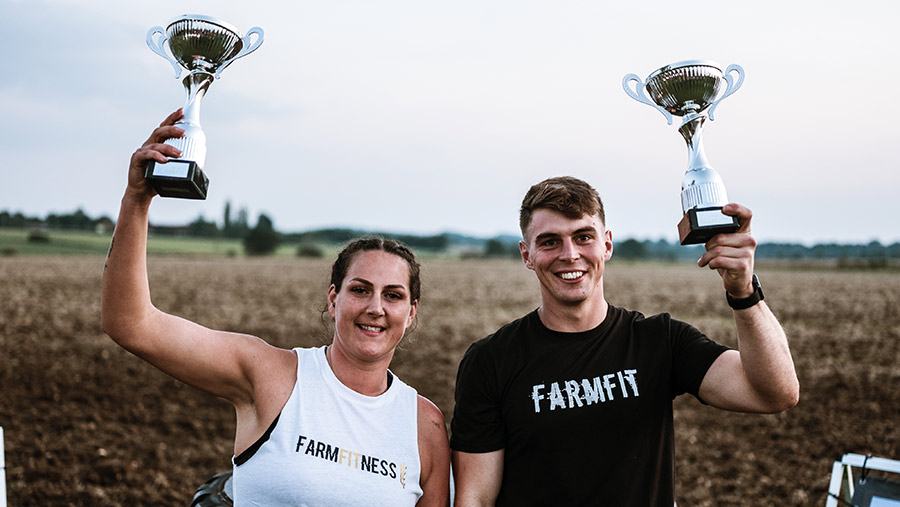
Britain’s Fittest Farmers 2021 Erica Robison and James Arney with their trophies © MAG/Colin Miller
The competition was intense, but two winners have now been crowned in Farmers Weekly’s iconic initiative, designed to spark a discussion about mental and physical health in the countryside.
Erica Robison and James Arney faced stiffed competition from the other finalists to win the titles – James has now both the 2020 and 2021 titles to his name.
See also: Britain’s Fittest Farmer 2021 – meet the finalists
Watch the video of the final and read more about the winners below.
Erica Robison
Age: 32
Location: Cumbria
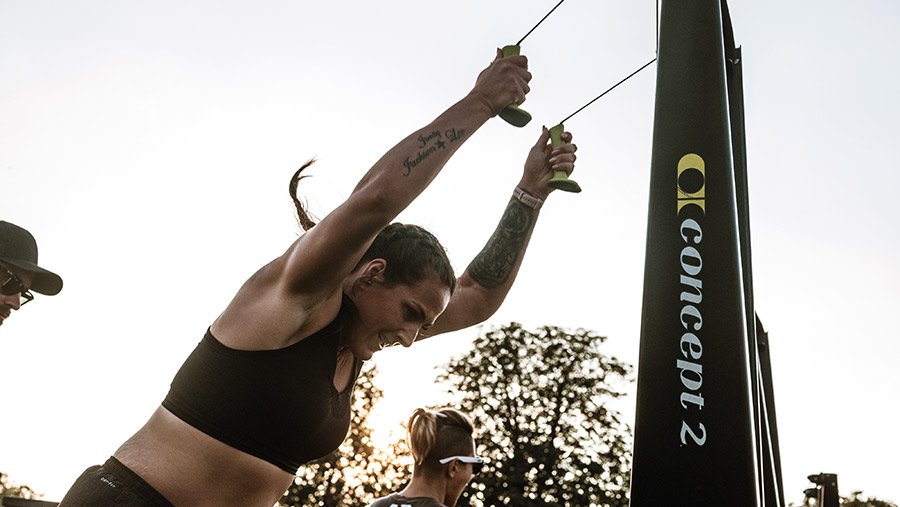
© MAG/Colin Miller
“I’m trying to get all the girls in my life addicted to endorphins,” says Erica Robison.
The 32-year-old is smiling, but making a serious point – as a personal trainer and fitness instructor, she’s on a mission to encourage others to enjoy and value the benefits of exercise and sport.
“When you push yourself physically it produces endorphins, and they give you a buzz,” says Cumbria-based Erica.
“You might feel exhausted afterwards, but it makes you more positive and more able to face challenges.”
Erica enjoys a range of sports, including boxing and running. “I like running as part of a team. Sometimes, you’re so busy talking you don’t realise you’ve just run five miles.
It’s about the company and distracting yourself from what’s going on in your life – you don’t always have to push yourself to the limit, although I tend to because that’s the sort of person I am. Once I get something in my head, I’ll give it 100%.”
Boxing
Erica first became passionate about exercise after she’d had her second child six years ago. Her fitness levels had deteriorated over a few years, so she decided to act.
“A friend encouraged me to get involved with a charity boxing initiative. I walked into the gym not having a clue, but I immediately loved it and I now coach boxing classes at that same gym.”
She works at the gym three days a week, juggling it with helping at her dad’s farm just over the border in Scotland at weekends and in holidays – doing everything from fencing to weighing cattle.
“My brother and I grew up on my gran’s dairy farm on a little island in Argyll, so I’ve always loved the outdoors and fresh air.”
Nowadays, there’s nothing she likes more than a long walk in the fells.
“I’m so lucky to live right on the doorstep of the Lake District. Sometimes, on a Saturday in summer, I’ll say to the kids: ‘Right, get your boots on, I’ve made ham sarnies, get your backpacks, we’re away’.”
Her eldest two boys, Leo and Jackson, have both scaled Blencathra, and the youngest, Jonty, has been up Talking Fell, even though he’s only three. “It only takes an adult an hour and it took us all day – but he managed it.
“You get to the top of a mountain and see all that open space and it’s just so peaceful. You take deep breaths and think: This is what life is all about. You’re burning calories and getting fit at the same time – so it’s a no-brainer to do it!”
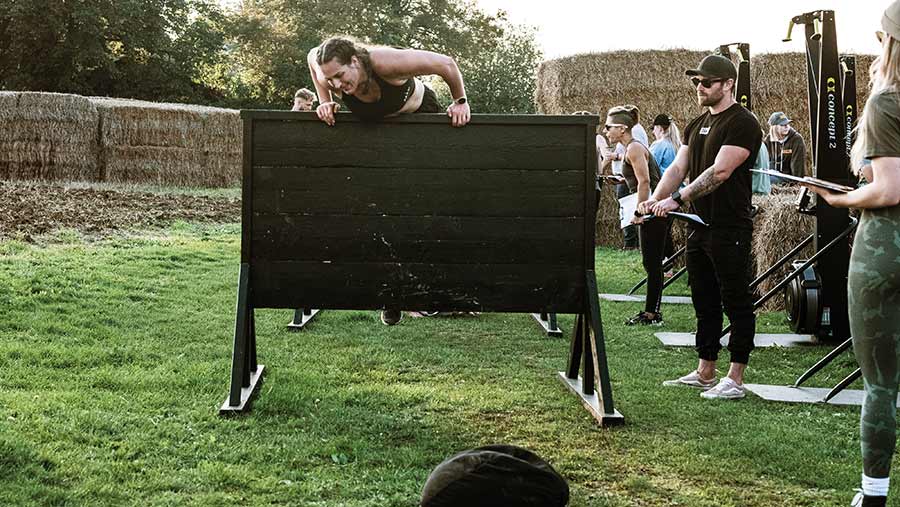
© Colin Miller/MAG
Erica reckons having the right guidance and coaching from the start was key to her development as an athlete.
Support
“Those people saw something in me that I didn’t know was there – and that’s what I’m trying to do for others now.
“I try to set people off in the right direction and show them what they’re capable of. I have conversations with them all the time about mental health, too.
“Generations ago, mental health issues existed, but just weren’t talked about, so there was no help available. The Covid-19 pandemic has caused so many problems, it’s more important to talk about it than ever.”
Getting physically fit, using the gym and doing exercise have helped her overcome challenges and get through tough spells, and she now wants to spread the word.
“This is why Britain’s Fittest Farmer is such a great initiative, because it puts equal emphasis on physical and mental health, and the two are so closely linked.
Physical and mental health
“Most of my clients are women and I can tell by their faces when they come in that they really need to do a class. You can see when they leave that they’re then ready for the day – and I know I’ve done my job when that happens.
“Whether it was spin or boxing, they’ve really attacked that class, given it everything and learned something about themselves. People sometimes just need to take the initial leap out of their comfort zone.
“I work out and burn calories to stay in shape, but it’s mainly to feel good,” says Erica. “If I feel like I need a boost, I work out.
“Everything that happens makes you the person you are – and I feel that who I am today is the best version that I could be of myself.
“I’m trying to set a good example to my kids – encouraging them to get outside and take exercise and they love doing this. When they’re on my dad’s farm, they’re never indoors.
“As I sometimes say to them: ‘Every day is a new opportunity to be the best you can be’.”
James Arney
Age: 26
Location: Somerset
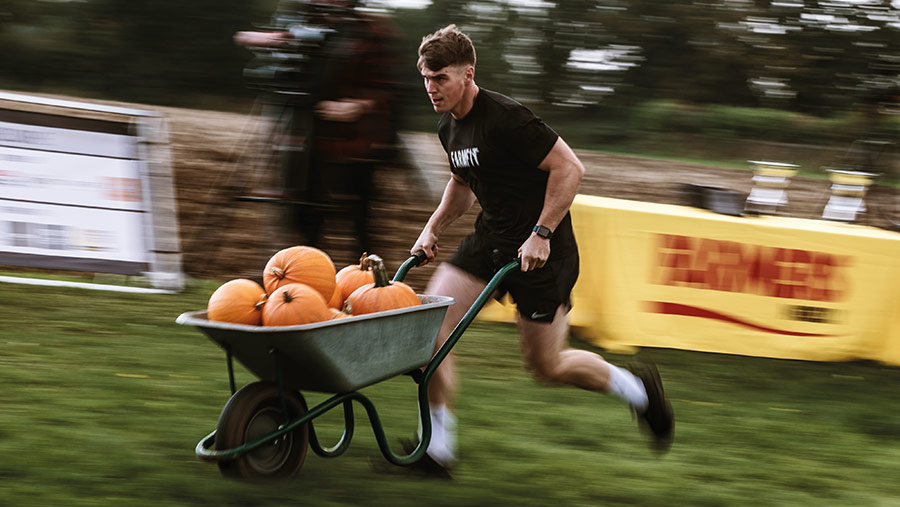
© MAG/Colin Miller
Winning the men’s award at this year’s Britain’s Fittest Farmer marks two victorious years on the trot for Somerset-based James Arney.
“I certainly didn’t think I’d do it a second time, but I thought I had to go back and defend my title – so that no one could say it was just luck that I won the first year!”
James, who works on the family farm, has played sport all his life. He loves rugby, cricket, football and running.
He even created a gym during the Covid-19 lockdown with his brother in a garage on the farm so he could continue to work out while gyms were closed.
“This means I can train whenever I get a few minutes – even in a lunch break. When your free moments depend on what work is happening on the farm, you have to be flexible.
“Because we’ve got the gym equipment in the garage, we don’t have to go anywhere – we don’t have to travel or pay membership fees. I can literally finish work, take a few steps and be in the gym.”
Time away from work
James is a big believer in the benefits of exercise – especially for those in full-on, stressful sectors such as farming.
“I live where I work, so it can be hard to switch off and there is always something to do. Fitness is maybe an hour a day when I can get away from work.
“My physical exercise takes me away from my job and this has been especially important over the past 18 months, when there have been times when it’s been impossible to get out.
“During the summer, you can always find a reason to work longer hours. Suddenly its 9pm and you’ve done another 14-hour day.
“Training has given me a reason to stop work,” says James, who recently completed a level 5 agricultural management degree at Cannington College.
“Farmers work incredibly hard and often don’t have enough time off, which is understandable because, if you’re self-employed, you don’t get annual leave or sick pay.
“But time off is as important as hard work. You come back refreshed, able to make better decision and probably safer, too, as you’re less likely to make mistakes.”
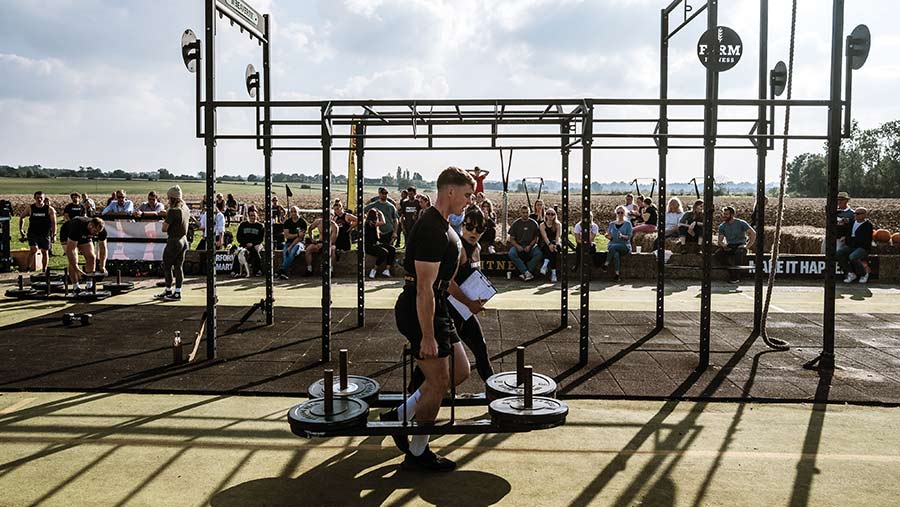
© MAG/Colin Miller
James, who is involved with the farm’s heifer-rearing and sheep enterprises, is a particular advocate of team sports.
“I like the team ethic and the social side. I’m quite a competitive person and have a strong desire to win. I don’t like losing in anything I do. If I set myself a challenge, I’ll usually achieve it.
“This is probably just as well, because you must be competitive to get on in farming at the moment – you certainly need to have drive.”
James aims to fit in at least five gym sessions and two runs a week. “Running in the countryside is fantastic – there’s no one else around, there’s all that fresh air and it’s free.
“I particularly enjoy running in the summer after work when it’s quiet and there are beautiful sunsets.
“It can be hard to find time, but you have to make time. Some days I’ll get up early and train before work.”
Mental health
The pressures of farming in any sector – the low returns, the long hours and the isolation – can bring mental health challenges for everyone involved, suggests James.
“Farmers are more aware of – and interested in – fitness and mental health than they were a few years ago.
“The younger generation, especially, understand that their bodies and minds are as important as anything on the farm – without them, they can’t work.
“The past couple of years have been so tough that it’s important we encourage everyone to do some exercise and open up about mental health.
“Everyone has struggled to a greater or lesser extent during the pandemic, especially with multiple lockdowns.
“Farming is a demanding job, and people might be out in the fresh air but this doesn’t necessarily mean they’re particularly fit
“Mental health is spoken about a lot more than in the past – which is important, as talking about it is the first barrier to overcome.
“Social media has helped in this respect. There’s a lot more help available and people are more prepared to get that help, whereas historically they might not have been.”
James reckons the 2021 Britain’s Fittest Farmer competition was tougher than in 2020. “The final was horrible – in a good way,” he says.
“I’m not so good at weightlifting, but feel like I’m pretty good at endurance, so found those events a lot easier than the strength ones.
“It was great, though. I really enjoyed it and it was lovely to be able to take a group of supporters to cheer me on, unlike last year, when numbers were so limited.”
So what’s next on the list for this man, who clearly relishes a challenge? “I’m considering doing either a full or a half Ironman Triathlon next summer.”
And what about competing in 2022 in a bid to make it three in a row? “People keep asking, but I’ll decide nearer the time.”
About Britain’s Fittest Farmers
Britain’s Fittest Farmer was launched by Farmers Weekly as a fun way of sparking a vital discussion about the physical and mental health of the nation’s farmers.
The competition aims to get all farmers thinking and talking about their health, physical and mental, to make sure they are in top condition to run their businesses.
Contestants initially applied online, then there was a round of qualifiers at Adam Henson’s Cotswold Farm Park, followed by phone interviews and then the finals, which saw 20 people battle it out at Tom Kemp’s Farm Fitness centre in Essex.
Alongside Tom, the other two judges were Jude McCann, chief executive of the Farming Community Network; and Lizzie McLaughlin, Farmers Weekly community editor.



